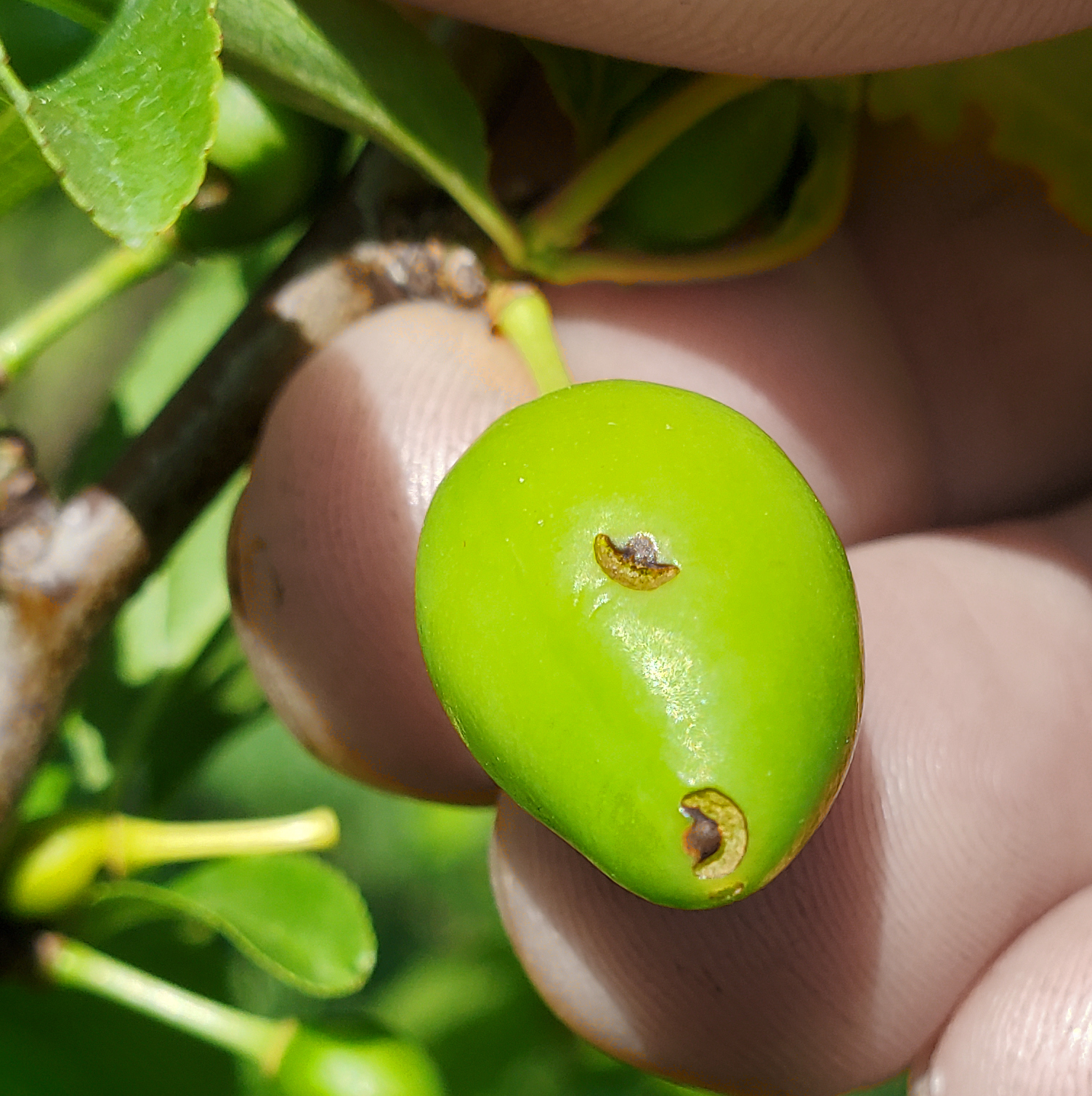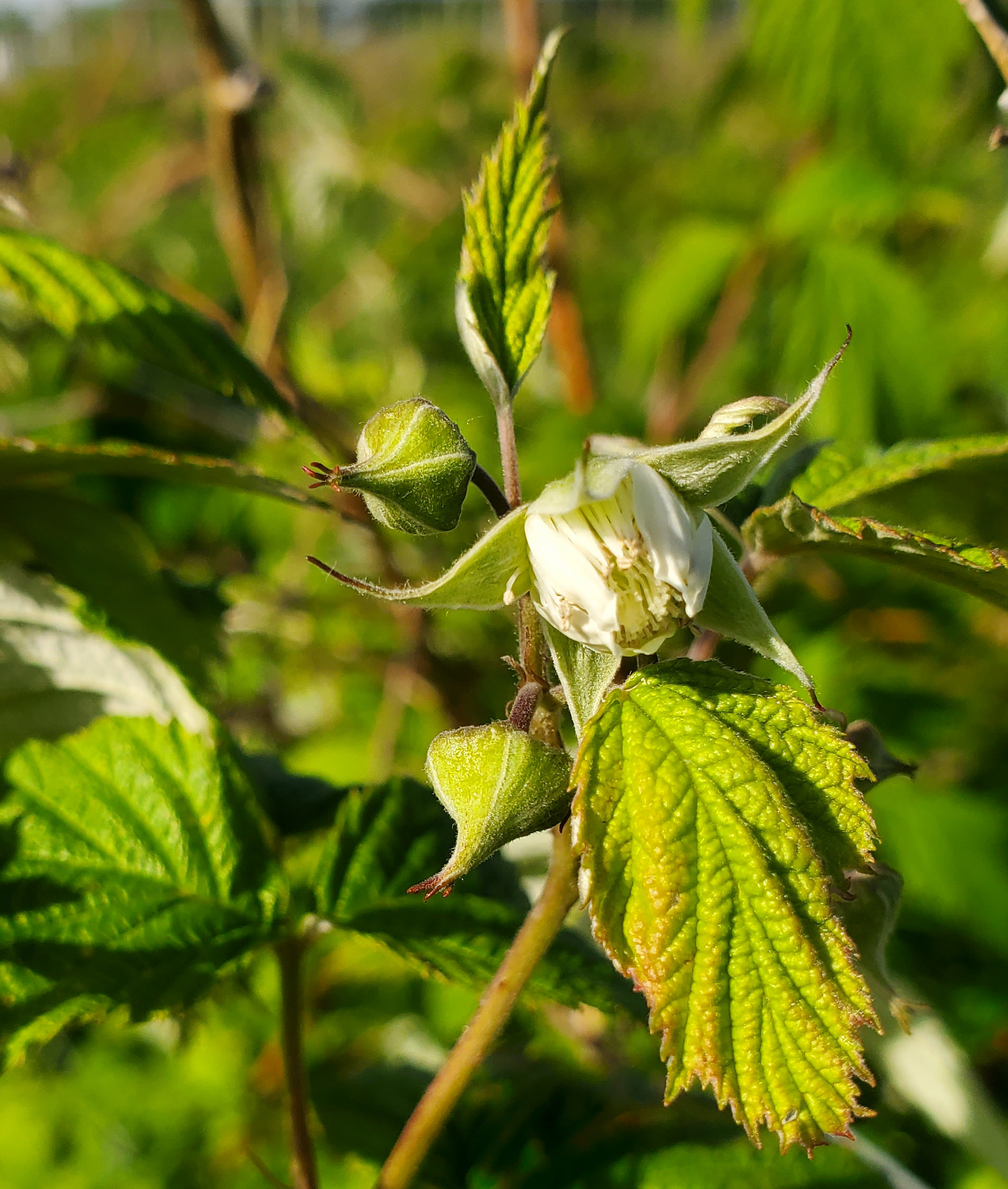Southwest Michigan fruit update – May 24, 2022
Spring blooming crops are beginning to size up. Brambles and other later blooming crops are beginning.

Weather
Last week started mild with high temperatures in the low 70s and lows near 50. Wednesday was the coolest day of the week with highs near 60 before climbing into the low 80s for Thursday and Friday. A cold front passed through southwest Michigan on Saturday bringing temperatures back down near 60 for the weekend. Many areas saw low temperatures below 40 Monday morning.
The region experienced scattered showers on Wednesday followed by a more organized storm system on Saturday. The thunderstorms on Saturday dropped more than a half inch of rain in many locations.
The coming week will be mild. The high temperatures will be in the upper 60s to mid-70s for much of the week, rising to 80 over the weekend. The best chances of rain are on Wednesday and Thursday.
With the mild week, we picked up an average number of degree days, 116 growing degree days (GDD) base 42, 64 GDD base 50.
|
Southwest Michigan GDD summary from March 1 through May 23, 2022 | |||
|---|---|---|---|
|
Station |
GDD 42 F |
GDD 45 F |
GDD 50 F |
|
Benton Harbor (SWMREC) |
697 |
559 |
368 |
|
Lawton (Lawton) |
690 |
555 |
367 |
|
Fennville (TNRC) |
635 |
506 |
328 |
|
Average for the SW region |
689 |
554 |
368 |
|
Average last week |
573 |
458 |
304 |

Tree fruit
Most tree fruit bloom is finished. Some later apple varieties have a tail bloom still out. Any remaining blossoms are attractive to bees and other pollinators. Be cautious with sprays, avoiding when possible, and spraying at night when necessary to avoid harming pollinators. Plum curculio egg laying damage on fruit has slowed with the recent cool weather.
The Enviroweather biofixes for oriental fruit moth and codling moth have been met and are being caught in traps. Oriental fruit moth is past peak egg hatch, codling moth egg hatch is beginning late this week. Obliquebanded leafroller flight should begin next week.
Apricot fruits are at 1 inch size.
Peach and nectarine bloom is finished. Most fruit are out of the shuck. Fruit are showing up in two cohorts at either 6-8 mm or 15 mm. Oxytetracycline should be used instead of copper for bacterial spot to reduce chances of phytotoxicity. Rusty spot management is needed after shuck split for susceptible peach varieties. Peach scab management is needed now. Peach leaf curl symptoms should be showing up soon.
In cherries, bloom is finished. Sweet cherries are at 15 mm, tarts are up to 11 mm diameter. Tart cherry crop potential looks good for southwest Michigan. ProGibb treatment for suppression of bloom on young trees generally starts about 3 weeks after bloom Recent rains have been cherry leaf spot infection periods helped along by warmer temperatures.
In plums, all varieties are out of the shuck. Japanese plum are up to 14 mm. European plums are mainly around 8 mm. Plum curculio oviposition has been seen in both types. Continue black knot management on susceptible cultivars until terminal growth is generally halted.
Apple varieties are mostly past petal fall with some late varieties with a little tail bloom. Very early varieties are 13-15 mm in diameter, with rest at 10-12 mm diameter. Cool weather will make thinning sprays more difficult. Scab sprays are needed during the primary scab season from March to early June to protect against ascospores released in rains. Powdery mildew symptoms are appearing on buds infected in 2021. May 16 was a fire blight infection period. Symptoms from this infection should start appearing approximately May 29.
Tarnished plant bug and green fruitworm damage has been seen in the area. Tarnished plant bug becomes active when we see temperatures above 70. Treatments after bloom are typically common for this pest. Codling moth biofix was approximately two weeks ago for much of the region. Egg hatch should begin soon. Egg hatch is when treatments typically start for this pest.
Pear are at 15 mm.
Small Fruit
Grape shoot lengthening continues. Concord and Niagara are at 12-15 inches of growth in Berrien County, 8-12 inches in Van Buren County. Hybrids are not far behind. Vinifera grapes are 6-12 inches for most varieties. Pre-bloom management of phomopsis, black rot and powdery mildew are the primary focus at this time. Wild grape clusters are expanding and separating. Bloom is expected soon. Wild grape bloom is used as the biofix for grape berry moth management later in the season.
Blueberries are in late bloom or petal fall, depending on variety. This is still a good time to be scouting for mummy berry Spores are being released now and will spread with rain events this week. Remember when applying fungicides to avoid applying when bees are flying, typically between 10 a.m. and 4 p.m. According to Enviroweather, cherry fruitworm egg laying will begin this week in parts of the region. Cranberry fruitworm egg laying will likely begin next week. Fruit are required for egg laying and damage, so management usually begins after fruit set and when egg laying begins.
Strawberry bloom continues. Fruit are beginning to size. All the leaves are out by now, maintain fungicide coverage to protect the leaves and help prevent botrytis as fruit begin to show. With fruit beginning to form, western flower thrips populations should be monitored and appropriate insecticides used as needed.

Bramble shoot elongation continues and new canes are emerging in fall bearing raspberry fields. In more advanced areas, bloom has begun. Raspberry sawfly scouting should begin. This insect causes leaf damage that can stress the plant, potentially reducing the crop potential.

Cranberries green leaves are beginning to emerge.
Currant and gooseberry bloom has ended. Many varieties are up to 9 mm.
Hops are training up the strings. They are up to 4 feet tall at this time.
Paw paws are blooming.

Chestnuts and hazelnut shoots are elongating. Leaf damage from leaf beetles can be seen in hazelnuts.
Upcoming meetings
Our regular Southwest Michigan Monday Fruit IPM Updates has moved to a hybrid format. The meetings are being held in person with virtual attending also available online. Our meetings are on Mondays beginning at 5:30 p.m. You do need to register to receive the Zoom link and password for these meetings. A link is emailed each Monday morning for that evening’s update. The webinars are free of charge and two pesticide applicator credits and certified crop advisor credits are available for each meeting.
Join MSU Extension on June 9 from 5-7 p.m. for our Blueberry Preharvest Meeting at the Van Buren ISD in Lawrence Michigan. We will hear from MSU researchers and educators and have a few updates from industry leaders. We will send out more information as the program schedule is finalized. This program will be offered in person and virtually at no cost, so make sure and sign up today! It
Related articles
- 2022 Fruit insecticide registration update
- Southwest Michigan fruit update – May 17, 2022
- Michigan grape scouting report – May 18, 2022
- Southwest Michigan fruit update – 2021 review
- 2013 bloom dates for southwest Michigan tree fruit crops
- Managing bacterial canker in sweet cherries: What are the options?
- Scouting for mummy berry
This work is supported by the Crop Protection and Pest Management Program [grant no 2021-70006-35450] from the USDA National Institute of Food and Agriculture.



 Print
Print Email
Email




